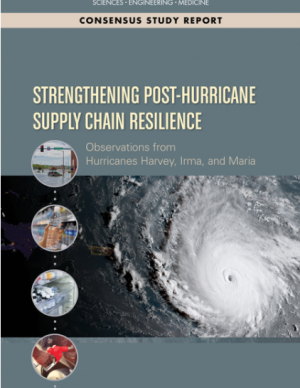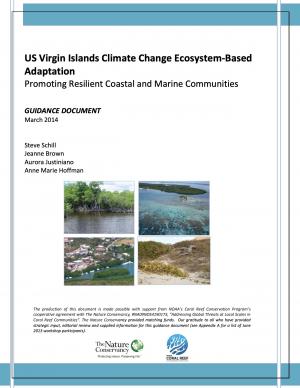Access a range of climate-related reports issued by government agencies and scientific organizations. Browse the reports listed below, or filter by scope, content, or focus in the boxes above. To expand your results, click the Clear Filters link.
In the third quarter of 2017, Hurricanes Harvey, Irma and Maria revealed some significant vulnerabilities in the national and regional supply chains of Texas, Florida, the U.S. Virgin Islands, and Puerto Rico. Drawing on lessons learned during the 2017 hurricanes, this report explores future strategies to improve supply chain management in disaster situations. It makes recommendations to strengthen the roles of continuity planning, partnerships between civic leaders with small businesses, and infrastructure investment to ensure that essential supply chains will remain operational in the next major disaster. Focusing on the supply chains food, fuel, water, pharmaceutical, and medical supplies, the recommendations of this report will assist FEMA as well as state and local officials, private sector decision makers, civic leaders, and others who can help ensure that supply chains remain robust and resilient in the face of natural disasters.
As with the rest of the world and the Caribbean region in particular, the coastal and marine communities of the US Virgin Islands (USVI) are susceptible to the effects of climate change. Hazards include increasingly hazardous coastal conditions and loss of life-sustaining marine, coastal, and island resources. Climate change is anticipated to add to the stresses of the coastal environment by altering temperature and precipitation patterns, increasing the likelihood of extreme precipitation events, and accelerating rates of sea level rise.
Responding and adapting to such changes requires an understanding of the risks; weighing options for adapting to changing conditions; and instituting a suite of strategies to implement, measure, and fund response actions having the most benefits to the ecosystems and communities that depend on those services. With support from National Oceanic and Atmospheric Administration’s (NOAA) Coral Reef Conservation Program, The Nature Conservancy’s (TNC) Caribbean Program directed a project with the objective of developing decision-support tools and conservation strategies that will advance the implementation of ecosystem-based adaptation (EBA) to climate change within the USVI.





